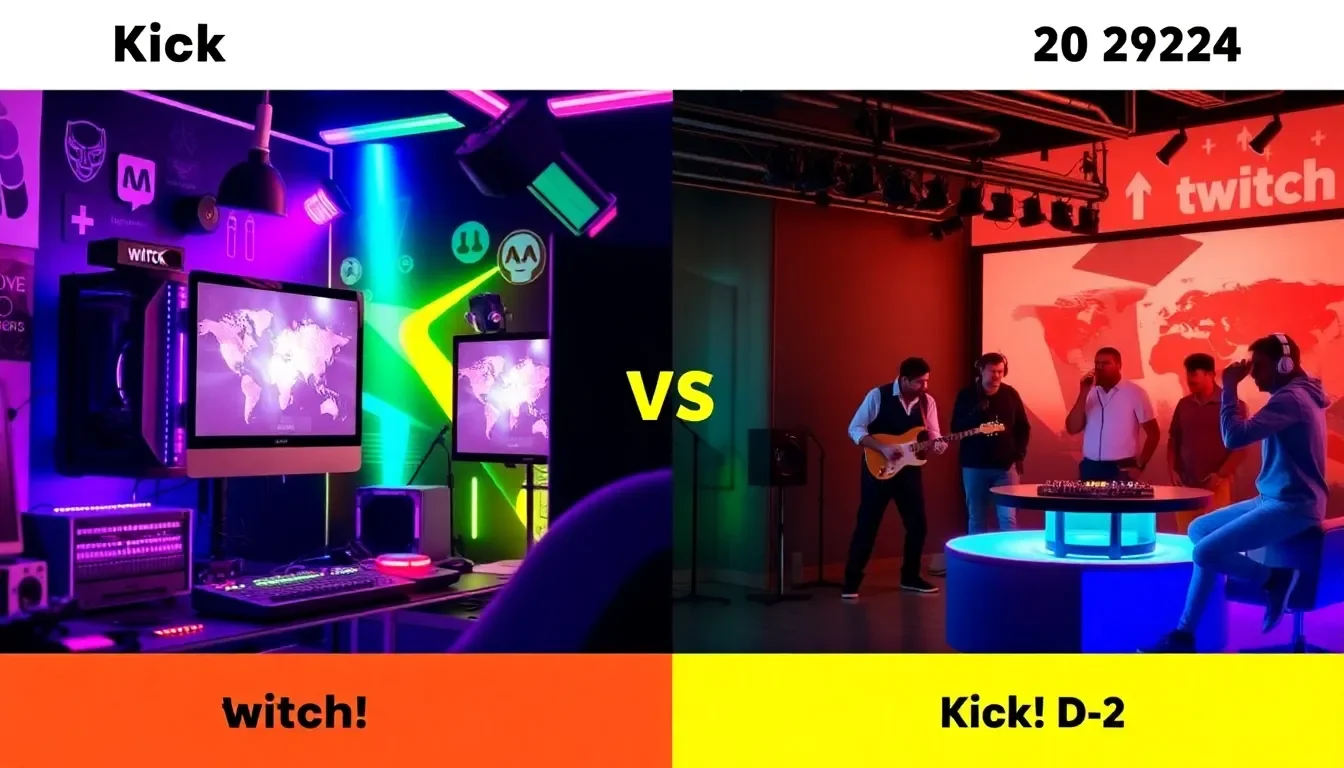As the world of online streaming continues to evolve, the platforms that support it have also transformed dramatically. In 2024, two platforms stand out as premier destinations for content creators: Kick and Twitch. While Twitch has long been the established giant in live streaming, Kick has made significant strides, positioning itself as a formidable competitor. For streamers looking to maximize their reach, engagement, and potential revenue, the question is no longer whether Twitch is the only option but whether Kick can provide a viable alternative. This analysis delves into the strengths and weaknesses of both platforms to help creators make informed decisions about where to invest their time and energy.
Platform Overview
Kick is relatively new to the streaming scene but has quickly garnered attention for its creator-friendly policies and user-centric design. The platform's growth has been steady, leveraging the dissatisfaction among some streamers regarding Twitch's monetization practices and revenue sharing. Kick champions a more equitable approach, promising higher percentages of ad revenue and subscriber fees to its creators, which has made it appealing for those seeking sustainability and income stability in their streaming careers.
Conversely, Twitch remains a dominant force with a well-established user base and a proven track record. With over 140 million monthly active users*, Twitch provides streamers with a vast potential audience. Its powerful discovery algorithms and community features allow creators to connect with viewers seamlessly. However, many streamers have voiced concerns about Twitch's monetization policies, particularly regarding ad revenue cuts and the recent controversies surrounding DMCA claims and content moderation. This landscape has prompted many to explore alternatives like Kick to break free from restrictive practices.
Monetization Opportunities
Revenue Sharing Models
Kick's unique selling point lies in its favorable revenue-sharing model, which typically offers streamers a greater percentage of their earnings compared to Twitch. On Kick, creators can earn up to 95% of their subscription revenue and are also encouraged to pursue ad revenues without the stringent restrictions imposed by Twitch. This allows for a more entrepreneurial spirit, where streamers can actively promote and engage in sponsorships without fearing excessive cuts from the platform.
On the other hand, Twitch has traditionally employed a model that provides 50% of subscription fees to streamers, which can feel insufficient, especially for those generating substantial viewer engagement. As Twitch faces heightened scrutiny over its monetization policies, many content creators are advocating for a shift towards a more equitable structure. Larger streamers, in particular, have the leverage to negotiate better terms, but smaller creators often find themselves at a disadvantage.
Additional Revenue Streams
Both platforms offer various features that can enhance monetization. Twitch offers Bits, a virtual tipping system, as well as the ability to sell merchandise directly through the platform. Kick, while still developing its ecosystem, introduces features like game skin giveaways and has hinted at additional monetization tools that will likely mirror or improve upon Twitch's offerings.
For streamers focusing on diverse income sources, evaluating the longevity and viability of each platform’s monetization strategies is crucial. The evolving landscape could significantly impact long-term streaming viability—especially if creators can secure financial success and artistic freedom simultaneously.
Community and Engagement
Building a Community
One of the core aspects of successful streaming lies in community building. Twitch has invested heavily in features that foster community interaction, including chat moderation tools, channel points systems, and integration with Discord. These elements help creators cultivate loyal followings and engage with audiences actively, leading to higher retention and more robust viewer communities.
Kick, aiming to differentiate itself, has focused on a user-friendly interface designed for organic interaction. It promotes innovative features like community challenges and real-time interactions, enhancing collaboration among viewers and streamers. As Kick grows, its commitment to a vibrant community could become a significant factor in attracting and retaining users.
Community Guidelines and Content Moderation
Content moderation on both platforms has been a hot-button issue. Twitch has faced backlash over inconsistent enforcement of its community guidelines, leading some creators to feel insecure about their content. In contrast, Kick's approach emphasizes transparency and community-driven moderation, with an eye toward empowering creators. This difference could make Kick more appealing to those who value creative freedom and wish to escape the pressures of a heavily regulated environment.
Content Discovery and Viewer Engagement
Algorithm and Exposure
Twitch's recommendation algorithms and front-page visibility are integral to a streamer's growth. While the platform provides ample opportunities for discovery through curated categories and trending streams, many newcomers find it challenging to break through the noise. Emerging from the shadows of established competitors can feel daunting, particularly with the countless streamers attempting to stake their claim.
Kick has implemented a more simplified discovery approach that could benefit new streamers. With targeted recommendations based on viewer preferences and an interface designed to promote smaller channels, Kick ensures that emerging creators receive a fighting chance to establish themselves. However, as the platform grows, the pressure to maintain an equitable discovery system may complicate these initial advantages.
Viewer Interaction Features
Both platforms recognize the importance of viewer engagement and interaction. Twitch excels in offering shared experiences through features such as watch parties and co-streaming. Kick, still in its infancy, has introduced features designed to foster interaction, like gamified experiences within streams, but it has yet to evolve as extensively as Twitch in this area. Streamers must assess how critical these features are to their audience engagement strategies and overall streaming philosophy.
Conclusion
Determining the best streaming platform in 2024 comes down to individual priorities and needs. Twitch boasts a long-standing, expansive audience and a wealth of features, but its monetization policies and community guidelines can be restrictive. Kick, while newer, offers a promising alternative with generous revenue-sharing models and user-centric engagement features.
As the landscape continues to evolve, streamers should weigh their options carefully, considering factors like community building, monetization potential, and user engagement. Ultimately, the decision may rest on a blend of personal preference and growth opportunities within each platform, as the right choice could define the trajectory of their streaming career in the years to come.


